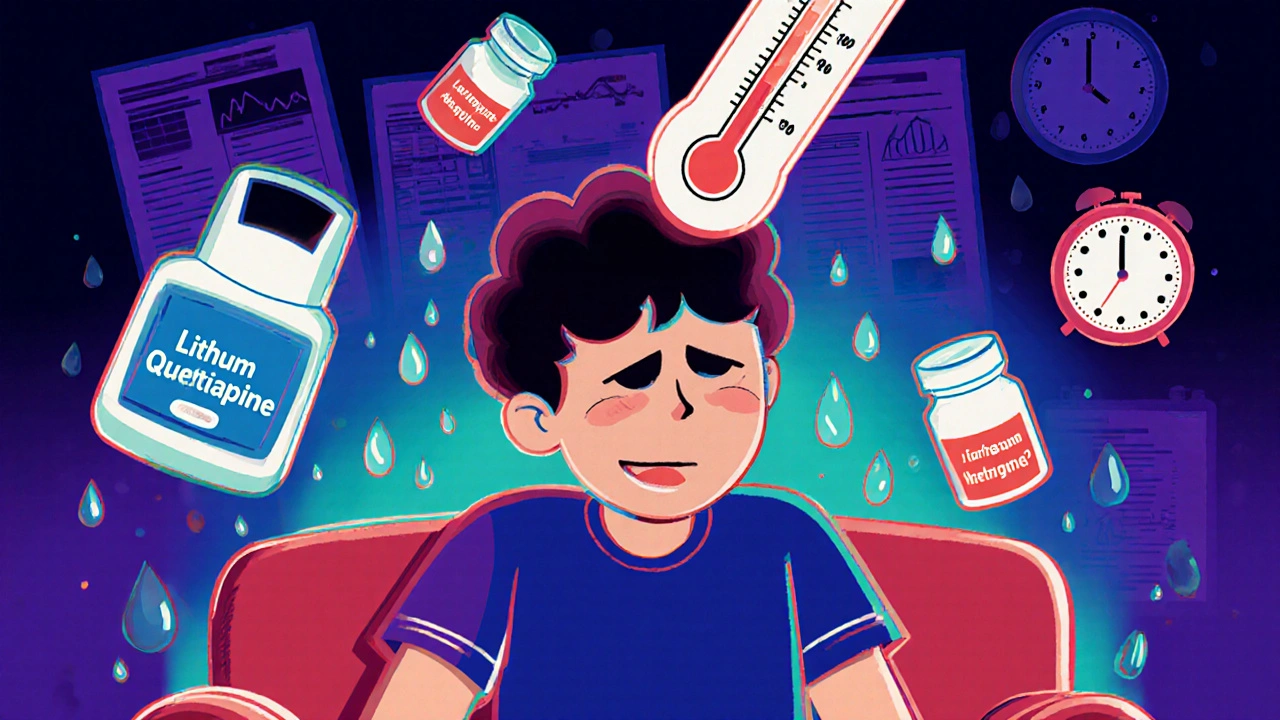Antipsychotics: quick facts, risks, and what to watch for
Antipsychotics are medicines used mainly to treat psychosis — symptoms like hallucinations, delusions, or very disorganized thinking. You’ll hear them called "typical" (older drugs like haloperidol) or "atypical" (newer ones like risperidone, olanzapine, quetiapine). They can help people think more clearly, reduce severe agitation, and improve daily function, but they also come with real side effects you should know about.
How antipsychotics work and what to expect
Most antipsychotics change brain chemistry by blocking dopamine receptors; many also affect serotonin and other brain chemicals. That’s why effects take days to weeks. Early on you might notice sedation or nausea. Over weeks, positive symptoms (hallucinations, delusions) often improve. Mood and motivation can take longer.
Doctors start low and increase the dose slowly. If you or a family member are new to these drugs, expect follow-up visits to check symptoms and side effects. Blood tests and weight checks are common with some drugs because of metabolic risks.
Common side effects and safety tips
Side effects vary by drug but the ones to watch for are: drowsiness, weight gain, feeling restless or unable to sit still (called akathisia), slowed movement or stiffness (extrapyramidal symptoms), and long-term risk of tardive dyskinesia — involuntary facial or tongue movements. Some atypical antipsychotics raise blood sugar and cholesterol, so regular monitoring matters.
Safety tips that actually help: don’t stop medication suddenly — that raises relapse risk. Tell your doctor about any movement changes, new muscle stiffness, or sudden mood shifts. Get baseline weight, fasting blood sugar, and lipids if your doctor recommends it. If you take other meds — like certain antidepressants, some antibiotics (for example, drugs that can affect heart rhythm), or medications that sedate — mention them. Some combos can raise side effect risks or affect heart rhythm (QT prolongation).
Pregnancy and breastfeeding need a specific chat with your prescriber. Some antipsychotics are safer than others, and choices depend on symptoms, past response, and medical history.
Want more practical reads? Check our posts related to psychiatric meds and safety: "Amitriptyline for Insomnia: Does It Really Help You Sleep?" and "Buy Tofranil (Imipramine) Online: Usage, Side Effects, and Dosage." These cover antidepressants, which often come up alongside antipsychotic treatment plans.
If you have questions about a specific drug, side effect, or how to switch treatments, use our contact page or bring your notes to your prescriber. Good conversations with your clinician make the biggest difference in finding the right, safe plan for you.

Bipolar Disorder: Managing Mood Stabilizers and Antipsychotics Effectively
Learn how mood stabilizers and antipsychotics manage bipolar disorder, their real-world side effects, and how to work with your doctor to find the right balance without giving up on life.

9 Alternatives to Risperidone: What You Need to Know Before Switching
If Risperidone isn't working for you, or the side effects are just too much, you're probably wondering what else is out there. This article takes a detailed look at 9 alternatives to Risperidone, covering how each one works, their upsides, and the possible drawbacks. We break down what makes each medication unique, so you and your doctor can make the best call together. You’ll find a clear comparison and straightforward facts — no medical jargon. Whether you're looking for fewer side effects or a better fit for your symptoms, this guide makes it all easy to understand.
